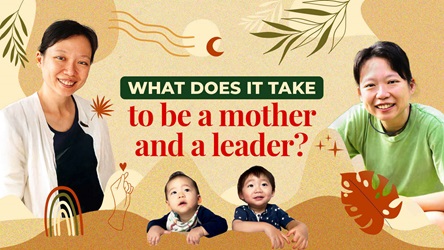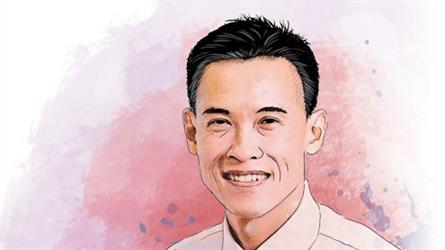"I Believe In Over-Communication"

The then recently appointed Deputy Secretary (Development) saw dorms resembling military barracks and construction sites with shaky scaffolding. He also gained a better picture of how MOM’s inspectors enforce safe working environments.
Visiting worksites and housing was quite a change, Mr Kok jokes, from visiting theme parks and high-end restaurants as part of his work assessing tourism products in his previous jobs with the Singapore Tourism Board (STB), and later the Ministry of Trade and Industry.
But those undercover trips showed him, first-hand, what some of the MOM officers do. Mr Kok then shared his experiences in his blog on the MOM intranet, so that others would know too.
Talking a mile a minute and peppering his observations with colloquialisms and Singlish, Mr Kok is clearly passionate about communication at work. He is also fond of using abbreviations. The 45-year-old describes his role at the MOM as being about the “three Es — making the MOM more efficient, more effective and more engaged”.
“My job includes looking at how we can be more effective and clearer in our communications to staff,” Mr Kok says.

He hosts lunchtime meetings, called “MOM Bites”, to help MOMers, as staff in the ministry are known, understand policies better. Mr Kok also holds informal engagement sessions with MOMers — so far, he has met almost 500 officers (out of a total of 1,700 staff ) through these dialogues. These sessions bring together people from different parts of the organisation and allow many who have never met before to interact. At the same time, it provides him an opportunity to get feedback on organisational issues.
As most MOMers do not know what happens in senior management meetings, such sessions are also opportunities for Mr Kok to share the latest developments and priorities. He also uses his blog to respond to any unanswered questions after townhall sessions. As he puts it: “If you bother to ask, I’ll bother to answer.”
“I believe in over-communication,” Mr Kok continues. “I believe in anchoring the organisation on its mission, vision and values. I over-communicate on these three things as a way to align MOMers to our business objectives and promote our organisational initiatives.”
Service excellence
While the MOM is often perceived as looking only after foreign manpower matters, Mr Kok describes its mission as a more holistic one of developing “a productive workforce and progressive workplaces” so that all workers have real income growth, fulfilling jobs and better financial security.
A key aspect of his work is driving service excellence as part of the ministry’s goal to become a trusted and citizen-centric organisation.

To achieve that, Mr Kok worked with a team of officers to develop a new set of service principles, called HEART (Hear them out, make it Easy, Anticipate their needs, Respect every individual, and be Timely), to drive a service excellence mindset throughout the ministry.
But applying HEART principles could be challenging when it was not always obvious how it could be relevant to an officer’s work.
There was some “pushback”, Mr Kok admits. For example, some enforcement officers initially could not understand how to use HEART principles while carrying out enforcement inspections.
“‘What HEART? I am just enforcing our laws and regulations; why do I need to be nice to the offenders?’ they told me,” Mr Kok recounts. He pointed out that they could apply “E: make it Easy” by simplifying the processing procedures of the offenders upon detention and apply “R: Respect the individual” by treating offenders with dignity.
On career moves
Mr Kok has distilled his leadership philosophy into a simple “ABC”: Always the mission, Bias for action, and Care for the people. Of the last one, he says: “I believe that in any organisation you cannot get things done by yourself, but only through working with people. And if you want people to care about the work, you need to first care about their career goals and overall wellbeing.”
When an officer is assessed for higher appointments, Mr Kok thinks what should be considered is not just the person’s ability, achievements and ambition, but also his or her learning agility.
“How adaptable are you to new situations? When you first join a new company or organisation, you may be ‘blur like sotong’, but you would likely have acquired the necessary skills and behaviours over time to perform your job well.
“It is important that you take time to reflect on your journey before the next posting, ask yourself what you did right or wrong, what you learnt and how to make the learning journey shorter in your next job,” says Mr Kok, who keeps a journal for this purpose.
Mr Kok says most people are not aware that his first job was with Standard Chartered Bank where he persuaded “major accounts” to borrow money from the bank.
“After some time, I felt there should be more to work than making money... I looked at my skillsets and asked myself where I can apply and deepen them for a larger purpose. I thought, ‘I understand companies, I like marketing,’ so I decided to apply to the Economic Development Board (EDB).”
He describes the EDB as Singapore’s “best business school”, where relatively young officers — he was 25 years old then — could engage the CEOs of Fortune 500 companies and market Singapore to them as an investment location.
Mr Kok next joined Contact Singapore in Boston, Massachusetts, and was responsible for attracting talent into Singapore. After returning to Singapore, Mr Kok joined the STB to develop the Tourism 2015 plan. “So I went from hustling investors to hustling talent to hustling tourists to come to Singapore,” he quips.
At home, he reads regularly to his 12-year-old daughter. “We just finished the book The Girl Who Could Fly. I also offered to read regularly to my older daughter (age 15), but was rebuffed,” he says. He has better luck with meals — “nothing fanciful, just normal home-cooked food” — which he whips up as a way to relax, and also finds simple joy in seeing his family relish his cooking.

What’s your favourite beverage?
I’m not a coffee person. I enjoy unsweetened soya milk, which is my morning breakfast drink.
Where do you have it?
At home, together with my breakfast of overnight oats.
- POSTED ON
Jul 7, 2016
- TEXT BY
Tan Hwee Hwee
- PHOTOS BY
Norman Ng
-
Work Better
7 Writing Tips To Simplify Your Message
-
Letters
Speak Your Mind by Aw Kum Cheong









